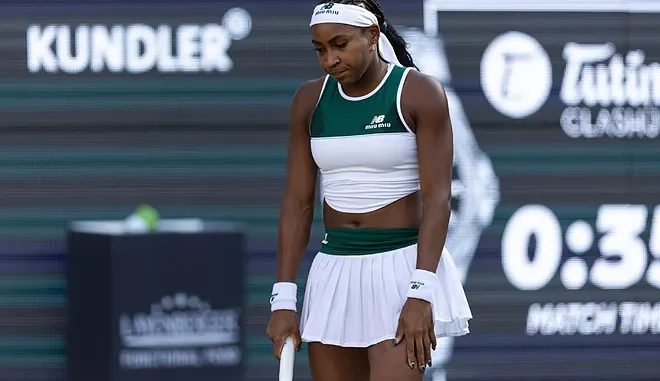
The glitz of professional tennis often masks a darker reality, one where players face relentless mental abuse that threatens their well-being. Coco Gauff, the World No. 2 and reigning French Open champion, has become a powerful voice in exposing this epidemic, speaking out in the wake of Emma Raducanu’s harrowing stalker scare at the Dubai Open. Gauff’s candid revelations, coupled with similar outcries from Jessica Pegula and other stars, have cast a spotlight on the toxic harassment—both online and in person—that plagues the sport. As the tennis community grapples with these challenges, players are demanding systemic change to protect their mental health and safety.
Gauff’s comments came days after a shocking first-round loss to Xinyu Wang at a recent tournament, a defeat that paled in comparison to the personal struggles she revealed. Reflecting on Raducanu’s ordeal, where the British star was left in tears after spotting a “fixated” man in the stands during her match against Karolina Muchova, Gauff shared her own unsettling experiences. “This happens to me too, I don’t know how it happens. My theory is maybe someone at the airport tips them off,” she said, describing how obsessive fans track her movements, often confronting her with stacks of photos and aggressive demands. The invasion of privacy, she noted, extends beyond tennis, affecting influencers and other athletes. “It’s something that we have to keep bringing awareness to,” Gauff urged, calling for social media platforms to take responsibility. “I would love for some of the social media platforms to get involved.”
Raducanu’s Dubai incident underscored the physical dangers players face. The 22-year-old, who shot to fame with her 2021 US Open win, was approached by the same man twice off-court, receiving a note and photographs that left her unnerved. During her match, she spotted him in the front rows, prompting her to hide behind the umpire’s chair in distress. “I literally couldn’t see the ball through tears. I could barely breathe,” she later recounted. The man, who had followed her across tournaments in Singapore, Abu Dhabi, and Doha, was ejected and signed a restraining order, but Raducanu chose not to press charges. The ordeal, her second stalking incident in three years, highlighted the persistent security gaps in women’s tennis, despite the WTA’s assurances that player safety is a priority.
Jessica Pegula, the World No. 3, amplified the conversation by exposing the vitriol she faces online. After her Roland Garros quarterfinal loss, Pegula shared screenshots of vile messages, including wishes that her family “get cancer and die.” “Every person on tour deals with it. It’s so bad,” she wrote on Instagram, describing the abuse as a constant barrage. Pegula’s openness echoed the experiences of players like Sloane Stephens, who has faced racist harassment severe enough to involve the FBI, and Katie Boulter, who received death threats at a WTA event in Nottingham. These incidents reveal a pattern of entitlement and hostility that female athletes endure, both digitally and in person.
The tennis world’s response has been mixed. While the WTA swiftly removed Raducanu’s stalker from the Dubai event and banned him from future tournaments, players like Gauff argue that reactive measures aren’t enough. The Fixated Threat Assessment Centre’s involvement at Wimbledon in 2016 and increased security at Indian Wells, where Raducanu returned to face Moyuka Uchijima, signal progress, but systemic issues persist. Monica Seles’ 1993 stabbing remains a grim reminder of the sport’s vulnerabilities, with players like Stephens noting that security measures haven’t evolved enough in decades.
Gauff’s call to action resonates as tennis heads into a busy summer, with Wimbledon looming. Her resilience, shown through her clay-court triumph over Aryna Sabalenka, contrasts with the emotional toll of harassment. Raducanu, now ranked No. 55, continues her comeback, buoyed by the support of peers like Boulter, who messaged her after Dubai, saying, “She’s a strong lady and she’ll get through it.” As players unite, their collective voice demands not just better security but a cultural shift to curb the abuse that tarnishes their sport. The question remains: will the tennis world rise to protect its stars?
Leave a Reply